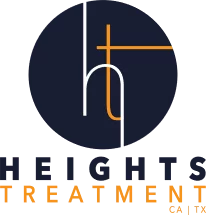Hope Follows Healing. Healing Starts at the Heights Treatment.
Intensive Outpatient Program (IOP) In Los Angeles
Our LA Intensive Outpatient Program
Also known as IOP, an intensive outpatient program is designed for clients who are not actively dependent on a substance or who still have drugs in their system. Those who benefit the most from The Heights Treatment IOP are currently sober and require long-term support, treatment, and accountability. For clients who haven’t attained sobriety and/or are still dependent, our partial hospitalization program (PHP) is more suitable than the IOP.
During our Los Angeles location’s IOP program, clients will participate in three hours of daily group therapy, one hour of weekly individual therapy, and one hour of weekly family therapy. Clients may be placed in IOP5, which meets five days per week, or IOP3, which meets three days per week.
Clients enrolled in IOP at The Heights Treatment’s Los Angeles facility will have the option to participate in weekly pickleball, kickboxing, hikes, beach yoga, and rock climbing.

IOP Program At a Glance
Treatment Modality
Duration & Frequency
Conditions Treated
Group therapy
Individual therapy
Family therapy
Our IOP groups meet Monday through Friday from 9 a.m. to 12:15 p.m. or 1 p.m. to 4:15 p.m.

How (and Why) IOP Works
During the recovery process, clients must confront troublesome behaviors, thoughts, and emotions. This is not easy to do alone. The goal of The Heights Treatment IOP is to provide a safe, stable, and structured environment to facilitate the recovery process.
In our LA-based IOP, clients receive up to 17 hours of clinically intensive programming per week, as specified in the patient’s treatment plan.
Efficacy of Intensive Outpatient Programs
In a study of community-based clinics providing intensive outpatient care and regular outpatient care for opioid-dependent African Americans, both groups were more likely to continue treatment, less likely to use substances, and had a higher quality of life.
Another analysis of 13 different studies revealed that IOP is effective at reducing substance use for people addicted to alcohol and drugs. The author of that analysis concluded that IOPs are an important part of the continuum of care for alcohol and drug use disorders.
Finally, in a study of post-9/11 veterans and service members with co-occurring disorders, IOP significantly decreased self-reported substance use, PTSD, and depression symptoms.
The Heights Treatment Los Angeles IOP Team
Click on the links below to learn about the IOP staff in Los Angeles.
What Our Los Angeles IOP Alumni Are Saying
The Heights Treatment IOP and the Continuum of Care
At The Heights Treatment, we strongly believe that there is no “one-size-fits-all” approach to treatment for mental health issues, substance use disorders, or co-occurring diagnoses.
Every client who undergoes treatment at The Heights Treatment first completes a pre-assessment. Based on this assessment, the Clinical Director and Treatment Team determine the appropriate Level of Care for the client.
Once the appropriate level of care is determined, the care each client receives is individualized based on:
- The results of the client’s multidimensional biopsychosocial assessment based on ASAM Criteria
- The client’s perceived needs
- The determination of the multidisciplinary treatment team
When the client has completed the goals on their treatment plan and/or has stabilized in recovery to such an extent that they can complete the treatment process at a less restrictive level of care, the client will transition to a lower LOC.
ASAM Assessment and the Continuum of Care
The ASAM Criteria is the most widely used and comprehensive set of guidelines for placement, continued stay, transfer, or discharge of patients with addiction and co-occurring conditions.
Using the ASAM Criteria in conjunction with our The Heights Treatment clinical staff’s professional judgment enables us to provide outcome-oriented, results-based care in our addiction treatment.
ASAM outlines various levels of care based on the outcome of the 6 ASAM dimensions assessment. These levels of care are on a scale ranging from 0.5 to 4, with 4 being the most intensive.
At The Heights Treatment, when the client has completed the goals on their IOP treatment plan and/or has stabilized in recovery to such an extent that they can complete the treatment process at a less restrictive level of care, such as our Outpatient Program, the client will transition to a lower LOC.
Continuum of Care at a Glance
Prevention/Early Intervention
Targets individuals at risk to prevent substance abuse through education and early support.
Outpatient
Participants live at home and attend regular treatment sessions, suitable for mild conditions
Intensive Outpatient/Partial Hospitalization
More frequent sessions than outpatient, blending intensive care with community living.
Residential/Inpatient
24/7 care in a live-in facility, offering structured treatment for severe addictions.
Intensive Inpatient
Highly structured, intensive care in a hospital setting for the most severe cases, including medical detox and stabilization.
Frequently Asked Questions about IOP Los Angeles
How does the IOP in Los Angeles tailor its program to individual needs?
The IOP at The Heights Treatment in Los Angeles customizes its program based on each client’s specific needs and preferences, identified through a comprehensive pre-assessment. This individualized approach includes a combination of group therapy, individual therapy, and family therapy sessions, alongside unique activities like pickleball and beach yoga, to support holistic recovery.
What types of conditions does the IOP in Los Angeles treat?
The IOP at The Heights Treatment is designed to treat individuals with substance use disorders, mental health conditions, and dual diagnosis. It provides a supportive environment for those who are currently sober yet require ongoing support, treatment, and accountability to maintain their recovery.
How does participating in physical activities benefit clients in the IOP?
Engaging in physical activities such as kickboxing, hikes, and rock climbing, offered by The Heights Treatment’s IOP in Los Angeles, benefits clients by promoting physical health, reducing stress, enhancing mood, and building a sense of community. These activities complement the therapeutic process, encouraging overall well-being and aiding in recovery.


